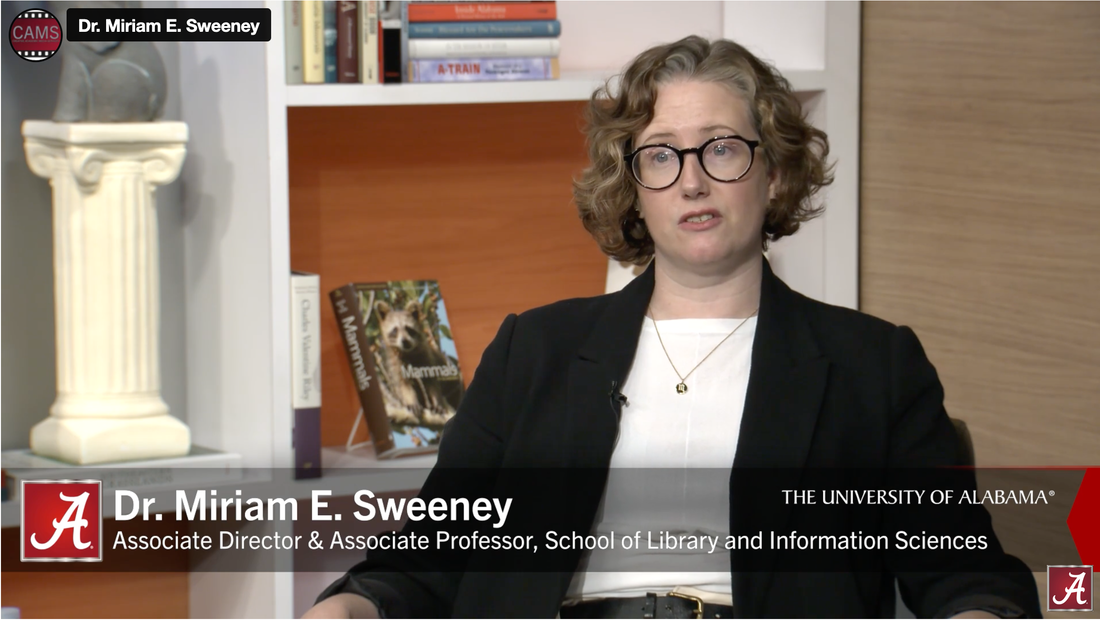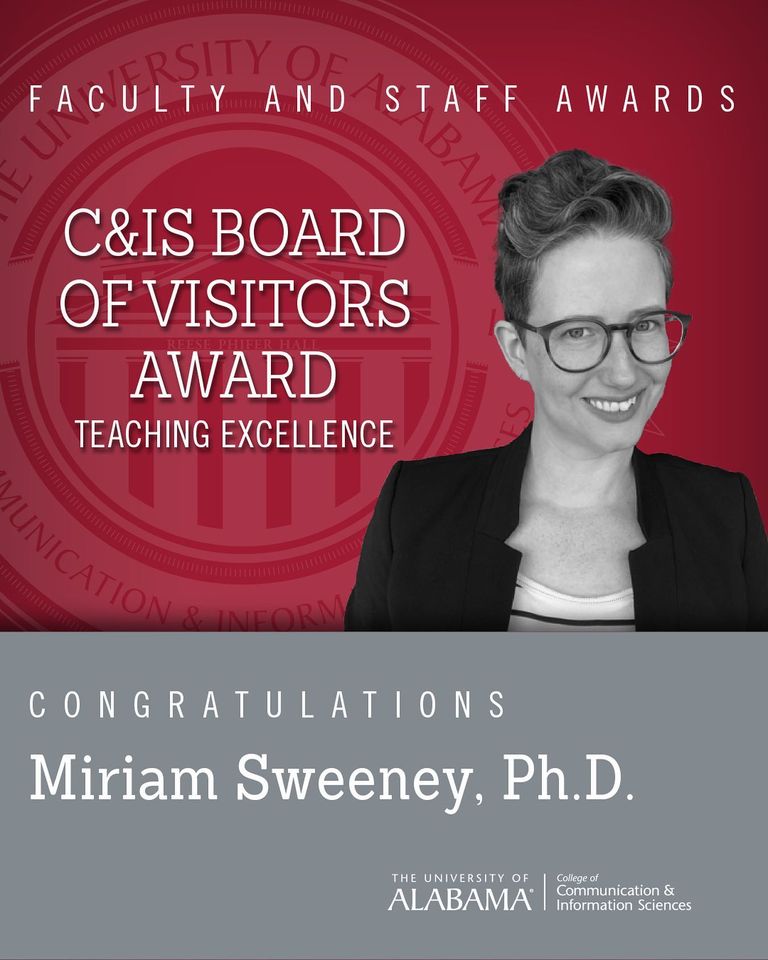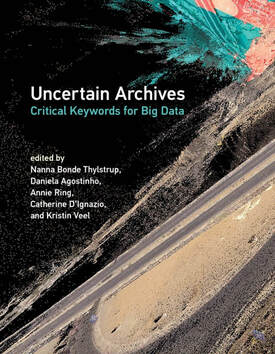|
I'm excited to announce the Dr. Casey Lynch and I have a new paper, "Evolving spatialities of digital life: Troubling the smart city/home divide" out in Digital Geography and Society. This project came together after Casey and I met as a contributing authors for an edited volume, Artificial Intelligence and the City (ed. Cugurullo, Caprotti, Cook, Karvonen, McGuirk, and Marvin), in 2022 and recognized potential for collaboration. It's been a pleasure to work with Casey, and we are very proud of the shape these ideas have taken. Cite: Lynch, C. R., & Sweeney, M. E. (2024). Evolving spatialities of digital life: Troubling the smart city/home divide. Digital Geography and Society, 6, 100085. https://doi.org/10.1016/j.diggeo.2024.100085 Abstract I was my pleasure to be featured as the Faculty Spotlight for the new University of Alabama Teaching Academy's January newsletter!
The UA Teaching Academy supports the institution’s strategic goal of providing a premier education characterized by outstanding teaching. It serves as an instructional resource hub and innovation center dedicated to promoting equitable and supportive learning environments and high-quality, evidence-based instruction. In this interview I share about my educational journey and discuss strategies and lessons I have learned throughout 15 years of teaching in Higher Education. It was a pleasure to talk with Dr. Claire Major and reflect on these questions; thanks, folks! I'm happy to announce that I am officially stepping into the role of Associate Director of the School of Library and Information Studies here at UA. In this role, I'll have the opportunity to guide the onboarding of new SLIS students, lead oversight of MLIS programmatic assessment, and assist with other SLIS administrative operations. I'm thrilled to join our amazing leadership team here at SLIS and contribute to building a positive culture for our faculty and student communities. Roll tide!
I'm excited to announce that I have officially signed a book contract with Polity Press for a critical project about voice assistants, surveillance capitalism, issues of design, ethics, and the future of voice as a ubiquitous interface. The book is provisionally titled, Voice Assistants, until I find that catchy, sexy title that eludes me at the moment. A brief summary of the book contents for those interested:
This book traces the development of voice assistant technologies melding technical, social, and political-economic perspectives to consider issues such as: the underlying big data infrastructures that voice assistants both depend on and shore up; the design and marketing of voice assistants as domestic/caregiving technologies; how ideologies of gender, race, and class are embedded in the design of voice assistants; the imagined uses (and futures) of voice assistants by the tech companies that design them; the extended data-gathering and reach of voice assistants both within and outside of the home; the ethical and privacy implications of voice assistants; the political economic landscape that frames voice assistants as ideal technological solutions for personal and home management; and the possibilities for reimagining and resisting voice assistants and the paradigm of surveillance capitalism they are imbricated in. Stay tuned for updates on the project! My first time attending the Console-ing Passions conference last week was an absolute delight. Returning to an in-person conference after several years of virtual attendance felt really exciting, and meeting this incredible group of feminist and queer media researchers made the environment feel welcoming, safe, and full of possibility (in a moment where that feeling is *desperately* needed).
Big shout-outs to the conference organizers Mel Stanfill and Anastasia Salter and their team of exceptional graduate students for pulling off a fun and informative event. You all crushed it. The abstract and talk for my conference paper, Refacing Gender in Digital Assistant Technologies, is now available online. Looking forward to seeing everyone in Calgary next year at Console-ing Passions 2023!
Facing Our Computers: Algorithmic Literacies as Praxis | Transcript
Miriam E. Sweeney, Associate Professor, School of Library and Information Studies, University of Alabama “Facing Our Computers: Algorithmic Literacies as Praxis” is a call to turn our attention to the current technological environment, characterized by increased reliance on algorithmic technologies, and grapple with it as part and parcel of the broader social, political, and economic landscape. Borrowing from Paulo Freire’s (1972) definition of praxis as “reflection and action directed at the structure to be transformed”, I invite us to consider how ”facing our computers” (i.e. developing critical algorithmic literacies as a reflective tool) might help LIS “expand the conversation” around algorithmic culture in our professional roles in order to better formulate actions and responses that lead us to better collective futures.
Abstract:
Recent examples of virtual assistant technologies designed as Latina information service workers are noteworthy objects of study for their potential to bridge analyses of Latinas’ labor history and information technology. Latinas in the United States have traditionally worked in blue-collar information technology sectors characterized by repetitive labor and low wages, such as electronics manufacturing and customer service. Latina information service workers, though fundamental to technoscience, have been largely invisible in histories of computing. Latina virtual assistants mark a shift in this labor history by relying on the strategic visibility of Latina identity in/as the technology interface. Our research explores Latina virtual assistants designed by Airus Media and installed as airport workers in airports along the southwestern border of the United States. We situate the technocultural narratives present in the design and marketing of these technologies within the broader histories of invisible Latina information labor in the United States. We find continuities between the ways Latinas have historically been positioned as “ideal” information workers and the use of Latina identity in the design of virtual assistants. We argue that the strategic visibility of Latina virtual assistants is linked to the oppressive structures of invisibility that have traditionally organized Latina information service workers. Cite as: Sweeney, M. E., & Villa-Nicholas, M. (2022). Digitizing the “Ideal” Latina Information Worker. American Quarterly, 74(1), 145–167. https://doi.org/10.1353/aq.2022.0007. (Pre-print available at http://ir.ua.edu/handle/123456789/7549.)
|
Archives
March 2024
Categories
All
|






 RSS Feed
RSS Feed
